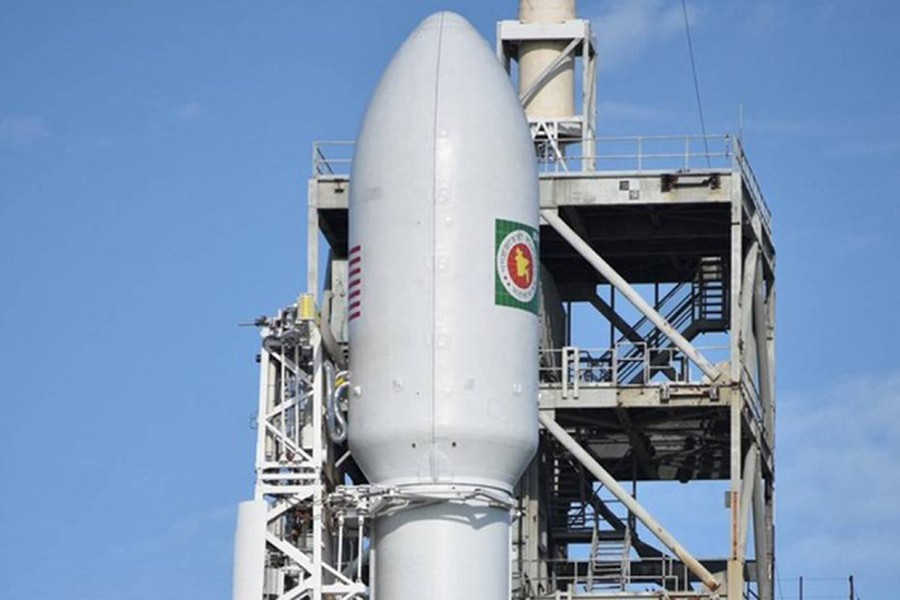
Published :
Updated :

A satellite in space, the launch of 4G service and the advent of local handset assembling are some of the highlights from 2018 for Bangladesh in telecoms, and information and communication technology (ICT).
So eventful was it that, looking back one might, in fact, feel that there have been very few years as action-packed as 2018 from a technological perspective.
As the year draws to a close, we take a look at some of the major developments that took place in the hi-tech arena here in the past 12 months.
4G Spectrum
The year started with high anticipations surrounding the launching of the long-awaited fourth-generation (4G) broadband cellular technology.
The 4G service has long been a major prerequisite given the country's growing online penetration led mostly by mobile internet.
It was also essential to bring faster and better internet services to the masses given the country's ongoing drive for digitisation.
In this context, a guideline was finalised back in late 2017 after a long wait before introducing 4G service.
Consequently, following a series of procedures, the government formally handed over 4G licence to four mobile operators on February 19 of 2018.
As such, Bangladesh became one of the last countries in South Asia to launch 4G cellular service.
As per the latest data from top mobile operators, 4G service has already been rolled out in almost all the district headquarters.
However, a large part of the rural and suburban areas is yet to be covered by 4G service.
Bangladesh in space
Perhaps, the biggest highlight of the outgoing year was the blast-off of the country's first commercial Bangabandhu-1 space satellite.
The geostationary satellite was launched from Kennedy Space Center in Florida on May 12, thus making Bangladesh the 57th nation to own an orbiter.
Experts have long noted that apart from enhancing the national prestige, having its own space satellite would economically benefit the country in multifarious ways.
For example, Bangladesh currently meets its demand for satellite connectivity through renting bandwidth from abroad and it has to pay $14 million a year for it.
However, once fully operational, Bangabandhu-1 is expected to save foreign currency as it will reduce this dependency on foreign operators.
The government is also planning to rent out half of the transponders to Southeast Asian countries.
Nevertheless, experts observed that far-sighted business strategies were imperative to make this satellite commercially viable in the long term.
Local handset assembling
The outgoing year also saw a number of local and international handset brands setting up their own assembling plants in Bangladesh.
Consumer electronics brand Walton actually set the trend as it became the first local company to set up a smartphone assembling plant in late 2017.
Until October 2018, four other companies like world-renowned Samsung, Chinese brand Transsion and local brands Symphony and Five Star followed suit.
This trend is expected to reduce the country's reliance on imported cellphones as it has to import millions of handsets from abroad annually to feed the growing local demand.
In 2017, about 34 billion mobile handsets were imported through legal channels. Of them, 8.2 million were smartphones, according to Bangladesh Mobile Phone Importers Association.
New rules, regulations
Back in July 2018, the central bank issued a new set of regulations for mobile financial service (MFS) in the country.
The regulations, which replaced the 'Mobile Financial Services for the Banks', effectively barred phone companies from holding any stake in any MFS provider.
Focusing on the permissible model for MFS providers, the regulation said MFS providers would be led only by scheduled commercial banks.
It also paved the way for interoperability between MFS providers and stipulated that MFS operators will have to enable payments from one MFS account to a bank account with the same parent bank or of another bank.
Apart from MFS regulations, multiple other policies and legislations related to ICT were brought into effect.
For example, the Digital Commerce Policy, aimed at bringing the burgeoning e-commerce trade under a regulatory framework, got the cabinet nod on July 16.
Months later, the much-debated Digital Security Act was railroaded through parliament amid debates.
VAT cut on Internet
The government, in its latest budget for fiscal year 2018-19, lowered Value Added Tax (VAT) on internet services from 15 per cent to 5.0 per cent.
The move, insiders said, was aimed at making IT services more affordable to the people.
It came at a time when the number of internet subscribers, especially mobile internet subscribers, is growing exponentially.
The country started 2018 with around 80.483 million internet subscribers. However, the number reached 91.818 million by the end of November, with more than 86 million mobile internet subscribers.
That means the number of internet subscribers has increased by 11.335 million or more than 14 per cent in the past 11 months of 2018 alone.
The number of mobile subscribers crossed the 150-million mark and reached 157.048 million by November.
This was an increase of around 8.22 per cent from the 145.114-million mobile subscriber base the country had at the beginning of 2018.
mehdi.finexpress@gmail.com


 For all latest news, follow The Financial Express Google News channel.
For all latest news, follow The Financial Express Google News channel.